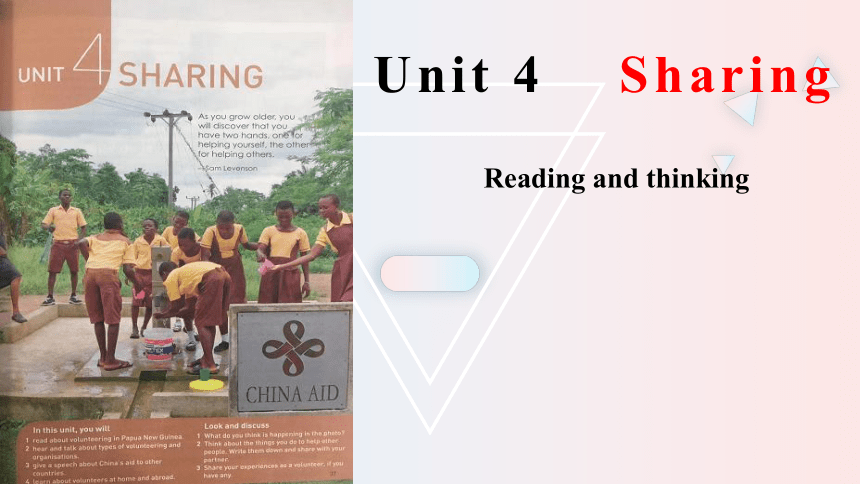(
课件网) Unit 4 Sharing Reading and thinking AS you grow older, you will discover that you have two hands, one for helping yourself, the other for helping others. ———Sam Levenson Your views Your views: Therefore, the whole world is a big family. We need to help each other and be responsible! Brainstorming: What challenges will you face if you work a volunteer in Papua New Guinea Share the opinions with your partner. Eating cultural conflict Language customs dislike lonely strange frightened Challenges: Predicting: What the text is possibly about Step 1: Pre-reading The text is probably about volunteering in the bush. Step 1: Pre-reading 4. What kind of help / aid do you know China is providing to other countries 2.45 万亿人民币 build roads build railways provide medical care and energy equipment build ports and factories for other countries. dig wells for Africans several billions provide agricultural technology exploit mineral resources. 1 We are going to read two blog entries by a young Australian, Jo, who worked for two years as a volunteer teacher in Papua New Guinea (PNG). What do you know about Papua New Guinea Pre-reading Independent State of Papua New Guinea 巴布亚新几内亚独立国 Do you know where PNG is 2 Look at the titles of the section and text and two pictures and predict what challenges do you think she might have faced. Poor living, teaching and learning conditions; Cultural shock; Loneliness and homesickness; Children of little education; Language and customs Safety problems; Poor transportation 3 Answer the following questions. (Page 39, Ex.3) 1. What do you think “the bush” means The jungle. 2. What has been Jo's most challenging subject to teach Why It's science, because her students have no concept of doing experiments and there is no equipment. Scanning 3. What did Jo notice about the homes in the village she visited They were low, round bamboo huts with no windows, with a door just big enough to get through, and with grass sticking out of the roof. 4. What did Jo notice after the meal A can standing upside down on the grill over the fire. 5. What is Jo’s general impression of the place and people there She was happy to have been there and felt it was a privilege to have spent a day with them. 6. Who are the “needy” What do they need Literally, the “needy” means needy people or people in need. Here it refers to the children such as thosei n the picture, who sit in poor classrooms are in urgent need of good education and various learning facilities. 1 What does Jo mainly talk about in her blog Some of her volunteer teaching experience at a bush school in Papua New Guinea; 2 Where does the text most likely come from A website. Skimming 3. What are the two blog entries relatively about The first blog entry is about: How Jo felt about receiving a parcel from home; How about the teaching and learning conditions and children in the bush school; How Jo handled the chal ... ...

